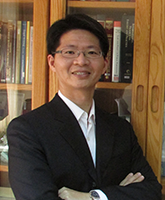

Dr. Tsung-Sheng Liao
Dr. Tsung-Sheng Liao is a Professor of Law at the Law Department of the National Chung Cheng University, Taiwan. He is currently the Director of Center for ESG and Sustainability Innovation (ESIC). He earned his LL.M. and S.J.D. degree from the University of Wisconsin Law School, US, in 2008. Professor Liao was a Visiting Scholar at UW Law School in 2014 and UC Berkeley Law School in 2019-2020 and a Visiting Professor at the Pacific Institute for Climate Solutions, British Columbia, Canada in 2016-17. His research focuses on international environmental law, climate change law and policy, transnational energy law and policy, and business and human rights. He has participated in many national-level research projects in the field of climate change law, renewable energy regulations, carbon capture and storage regulations, and business and human rights. He is the author of International/Transnational Environmental Law (2022) and the co-author of Republic of China and International Law-Important Events during One Hundred Republic Years (2011) and Conceptual Strategies of Carbon Capture and Storage Regulatory Framework in Taiwan (2012). He has published over 40 articles with regard to climate change issues, energy issues, human rights issues, and sustainability issues. He has also been invited to present scholarly papers in different countries, such as Bahrain, Canada, China, Germany, Japan, Korea, Norway, Singapore, Thailand, United Kingdom, United States, Vietnam and so on. He may be contacted at: lawtsl@ccu.edu.tw.
International Law
Taiwan Society of International Law ( http://www.tsil.org.tw/ )
Chinese (Taiwan) Society of International Law ( http://www.csil.org.tw/ )
Ministry of Foreign Affairs ( http://www.mofa.gov.tw/webapp/mp?mp=6 )
Asian Center for WTO and International Health Law and Policy (ACWH) ( http://www.law.ntu.edu.tw/center/wto/index.asp )
Law Schools
National Taiwan University College of Law ( http://www.law.ntu.edu.tw/english/index.html )
National Chengchi University College of Law ( http://www.law.nccu.edu.tw/Engpages/EN_main.htm )
National Taipei University College of Law ( http://www.ntpu.edu.tw/english/colleges.php )
Soochow University School of Law ( http://webbuilder.scu.edu.tw/builder/index.php?web=249 )
- From May 29 to June 1, 2011, the 2011 International Law Association ("ILA") Asia-Pacific Regional Conference was held in Taipei, co-organized by the ILA Headquarters, the Chinese (Taiwan) Society of International Law ("CSIL"), and the Research Center for International Legal Studies of the College of International Affairs at National Chengchi University. Approximately, 400 government officials, scholars and students from more than thirty countries participated in the conference, among them many members from ILA branches from East Asia, with distinguished guests from this region, Judge Jin-Hyun Paik and Shunji Yanai from the International Tribunal for the Law of the Sea ("ITLOS") and Justice Mariano C. del Castillo of the Supreme Court of the Philippines, among others. The theme of the conference was "Contemporary International Law Issues in the Asia Pacific: Opportunities and Challenges." Topics on the law of the sea, international economic law, private international law, international criminal law and human rights were among those addressed in the 16 panels.
- On October 7-8, 2011, the International Conference on Major Law and Policy Issues in the South China Sea was held in Taipei, co-organized by the Institute of European and American Studies and the Centre for Asia-Pacific Area Studies, Academia Sinica. Nearly 200 participants from governments and academic institutions attended the two-day event. The conference was marked by the high esteem held by the speakers and discussants, among them experts from research institutions from more than 10 countries, with scholars from China, Indonesia, Japan, Malaysia, Singapore, Taiwan and Vietnam in this region. A broad range of issues, such as national maritime claims, boundary delimitation, possible models for cooperation, navigation freedom and military activities, and regional dialogue process, were among the topics discussed. Of particular note is "cross-fires" over the nature of the Chinese claim, supposedly based on historic grounds, as well as the perceived roles of ASEAN countries, Japan and the United States.
- On September 23, 2011, Ministry of Foreign Affairs ("MOFA"), Taiwan announced that the "Agreement for the Avoidance of Double Taxation and the Prevention of Fiscal Evasion" between Taiwan and Slovakia was signed in Bratislava on August 10, 2011, and will enter into effect on September 24, 2011, which will be Taiwan's 22nd comprehensive double taxation agreement with other countries. What is noteworthy with this agreement is that, different from the usual model under which an agreement is to be concluded between the "Taipei Representative Office" in the country concerned and its counterpart in Taiwan, the Taiwan-Slovakia agreement was concluded between "the Ministry of Finance, the Republic of China", and "the Ministry of Finance, the Slovak Republic".
- A major investment protection agreement was signed on September 22, 2011 between Taiwan and Japan, each being among the other's most important trade and investment partners. The "Arrangement on the Liberalization, Promotion and Protection of Investment" concluded between "Association of East Asian Relations" on behalf of Taiwan and "Interchange Association for the Mutual Cooperation" on behalf of Japan, officials said, is a comprehensive agreement that does not only cover investment protection, but extends to provisions aiming at investment liberalization and trade promotion. It was reported that the agreement incorporated market opening lists for manufacturing and service sectors that exceeded those covered by commitments made under the WTO. After the conclusion of the said agreement, it was announced on October 25, 2011 that the officials of Taiwan and New Zealand are reviewing the feasibility of concluding an economic cooperation agreement, a move considered in Taiwan as another step toward opening the prospect of concluding more bilateral free trade agreements with its partners, possibly encouraged by the signing of the Economic Cooperation Framework Arrangement ("ECFA") between Taiwan and China. On the other hand, as of this writing there seem to be issues to be tackled in the negotiation between Taiwan and China over an investment protection arrangement and its conclusion was subject to delay.
Mr. Chen-En Sung (DPhil Candidate, St. Catherine's College, Oxford)
8, Achasan-ro 62-gil, Gwangjin-gu #402 (Taejin Suite) Seoul 05047 Korea Tel: 82-2-34360312 / Fax: 82-2-34360315 | Sitemap | Contact US
서울특별시 광진구 아차산로62길 8 (구의동, 태진빌딩) 402호 우: 05047
